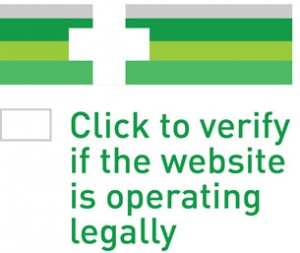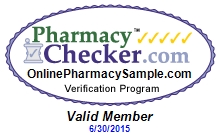by Gabriel Levitt, President, PharmacyChecker.com and Prescription Justice | Jul 1, 2015 | Advocacy, Online Pharmacies, Online Pharmacy Verification Services, Skipping medications
 Today, online pharmacies that are based and selling medication internationally within the European Union (EU) are required to publish a new EU online pharmacy logo, as shown in the image to your left. We have updated our Verification Program requirements to reflect the EU’s new rules. The practice of international pharmacy is expressly legal within the EU, unlike between, say, the U.S. and Canada, although some EU member countries place national restrictions limiting the scope of cross-border sales. Only online pharmacies based in the member states of the EU are eligible for the new seal. Each seal will contain a special link that consumers can click to verify the seal’s authenticity.
Today, online pharmacies that are based and selling medication internationally within the European Union (EU) are required to publish a new EU online pharmacy logo, as shown in the image to your left. We have updated our Verification Program requirements to reflect the EU’s new rules. The practice of international pharmacy is expressly legal within the EU, unlike between, say, the U.S. and Canada, although some EU member countries place national restrictions limiting the scope of cross-border sales. Only online pharmacies based in the member states of the EU are eligible for the new seal. Each seal will contain a special link that consumers can click to verify the seal’s authenticity.
 Like the PharmacyChecker seal (right), the purpose of the EU logo is to help consumers shop safely for prescription drugs over the Internet and avoid dangerous pharmacy sites. To obtain a PharmacyChecker seal, an online pharmacy must meet many safety requirements, but its program seeks to maximize global access to safe and affordable medication to protect public health. The PharmacyChecker seal can also be authenticated by clicking it. If the seal profile is not hosted on www.pharmacychecker.com, then it’s a fake seal!
Like the PharmacyChecker seal (right), the purpose of the EU logo is to help consumers shop safely for prescription drugs over the Internet and avoid dangerous pharmacy sites. To obtain a PharmacyChecker seal, an online pharmacy must meet many safety requirements, but its program seeks to maximize global access to safe and affordable medication to protect public health. The PharmacyChecker seal can also be authenticated by clicking it. If the seal profile is not hosted on www.pharmacychecker.com, then it’s a fake seal!
It’s very important to understand that regulating online pharmacies in the EU is very different from U.S. regulations that can prevent Americans from obtaining safe, affordable prescribed medication. Unlike tens of millions in America, citizens of the EU are generally not faced with having to choose between food and medicine due to the high cost of prescription drugs. Why? The costs for prescription drugs are much lower in the EU than in the U.S., and their healthcare systems better ensure that everyone has access to affordable medication. Therefore, unlike Americans, EU citizens are not usually looking online for medications to treat asthma, depression, diabetes, heart disease, osteoporosis, and stroke because they can afford them at local pharmacies. They are much more likely to be bargain hunting for less essential medications, such as those that treat erectile dysfunction and hair loss, because those medications are often not covered by health insurance policies in the EU – similar in that respect to health coverage in the U.S.
Identifying online pharmacies that sell safe and effective medications and meet critical safety criteria protects consumers, and so does helping them find the lowest drug prices. That’s why we launched PharmacyChecker.com in 2003. However, I have a mixed mindset about the new EU online pharmacy logo. I believe that people in the EU, like those in America or anywhere, should be able to access safe and affordable medication globally if they can’t obtain it locally. It’s difficult to tell if the EU’s new logo and rules will impede access to medicines; although, as discussed, drug affordability is a much, much smaller problem in the EU than in the U.S. We’ll be closely following how the new regulations are working and what impact they have on consumers and their online access to safe and affordable medicine.
Tagged with: European Union, logo, PharmacyChecker Verification Program, PharmacyChecker.com Verification Seal, seal
by Tod Cooperman, M.D., CEO, PharmacyChecker.com | Apr 14, 2015 | Drug Importation, Online Pharmacies, Online Pharmacy Verification Services
John Horton, the founder of LegitScript, a company which seems bent on preventing Americans from ordering affordable medication from outside the U.S., recently attempted to discredit PharmacyChecker.com with a false and misleading blog post. This is an old tactic of Mr. Horton. Why does he do this? At least two reasons come to mind: PharmacyChecker.com publishes information that helps Americans find safe and affordable medication from licensed foreign pharmacies and we have publicly exposed Horton’s seemingly unethical business practices.
LegitScript is allied with large pharmaceutical companies and U.S. chain pharmacies, entrenched business interests that lose money when Americans buy less expensive prescription medication outside the U.S.
Mr. Horton’s recent blog post discussed charges against Titilayo Akintomide Akinyoyenu, a pharmacist in Washington D.C. From 2005 to 2010, Mr. Akinyoyenu is alleged to have filled orders from his pharmacy for controlled medications pursuant to prescriptions written by a licensed doctor that were invalid because they were based on online questionnaires rather than a face-to-face examination. His pharmacy was licensed in the District of Columbia and is registered with the Drug Enforcement Agency to sell controlled medicines. He operated an online pharmacy, apexonlinepharmacy.com,which was associated with his licensed pharmacy. PharmacyChecker.com verified the licenses and DEA registration of Mr. Akinyoyenu’s pharmacy, and checked that the online pharmacy required a valid prescription and met other good online pharmacy practice standards, permitting his online pharmacy to be approved in the PharmacyChecker.com Verification Program until August 31, 2010.
Despite the fact that apexonlinepharmacy.com is not a PharmacyChecker-approved online pharmacy and has not been for about five years, Mr. Horton saw an angle in the allegations against Mr. Akinyoyenu to take a shot at PharmacyChecker and give his blog post the false and misleading title “Another PharmacyChecker Approved Internet Pharmacy Gets Indicted.” The indictment is not of the pharmacy, but of Mr. Akenyoyenu himself and it makes no mention of PharmacyChecker. (more…)
Tagged with: apexonlinepharmacy.com, controlled substances, john horton, LegitScript, PharmacyChecker Verification Program, walgreens
by Gabriel Levitt, Vice President, PharmacyChecker.com and Margaret Rode, PharmacyChecker.com | Dec 16, 2011 | Drug Prices, Personal Drug Importation
Two years ago, ABC News ran a segment (What Would You Do?) that showed Americans going out of their way to help strangers who could not afford their medication. Actors visited local pharmacies pretending they could not afford to pay for their much-needed prescription drugs – something that happens frequently in the U.S. Some people offered to help pay for part or all of the drug orders, and one man even left the pharmacy to get money from an ATM. In addition to financial assistance, these individuals also offered words of solidarity against the outrageous costs. Karen Wenberg (real person) told the woman (actress) she was helping: “Don’t be embarrassed. You know what? Medication is so f***ing expensive. There is no reason to be embarrassed… Sometimes we just pass on the good that’s been given to us.”
As we write this, Congress is marking up a new law, Stop Online Piracy Act (SOPA), one supported by the Obama administration that could effectively block Americans from acquiring safe and affordable medication from online pharmacies outside the U.S. As the government seeks to rein in spending, why do they want to stop consumers from getting non-tax-payer funded, affordable medication? When people go without medication, they can become sick or get sicker, putting a great burden on the health care system. To see what the government is doing, read RxRight.org’s guest post on techdirt. (more…)
Tagged with: ABC, assistance, brand name drugs, Congress, drug affordability, drug benefits, generic drugs, healthcare, high cost, legislation, local pharmacies, Medicare, pharmaceutical industry, PharmacyChecker Verification Program, prescription abandonment, prescription drugs, RxRights.org, savings, SOPA, Stop Online Piracy Act, tax-payers, tech dirt, United States, What Would You Do?
 Today, online pharmacies that are based and selling medication internationally within the European Union (EU) are required to publish a new EU online pharmacy logo, as shown in the image to your left. We have updated our Verification Program requirements to reflect the EU’s new rules. The practice of international pharmacy is expressly legal within the EU, unlike between, say, the U.S. and Canada, although some EU member countries place national restrictions limiting the scope of cross-border sales. Only online pharmacies based in the member states of the EU are eligible for the new seal. Each seal will contain a special link that consumers can click to verify the seal’s authenticity.
Today, online pharmacies that are based and selling medication internationally within the European Union (EU) are required to publish a new EU online pharmacy logo, as shown in the image to your left. We have updated our Verification Program requirements to reflect the EU’s new rules. The practice of international pharmacy is expressly legal within the EU, unlike between, say, the U.S. and Canada, although some EU member countries place national restrictions limiting the scope of cross-border sales. Only online pharmacies based in the member states of the EU are eligible for the new seal. Each seal will contain a special link that consumers can click to verify the seal’s authenticity. Like the PharmacyChecker seal (right), the purpose of the EU logo is to help consumers shop safely for prescription drugs over the Internet and avoid dangerous pharmacy sites. To obtain a PharmacyChecker seal, an online pharmacy must meet many safety requirements, but its program seeks to maximize global access to safe and affordable medication to protect public health. The PharmacyChecker seal can also be authenticated by clicking it. If the seal profile is not hosted on www.pharmacychecker.com, then it’s a fake seal!
Like the PharmacyChecker seal (right), the purpose of the EU logo is to help consumers shop safely for prescription drugs over the Internet and avoid dangerous pharmacy sites. To obtain a PharmacyChecker seal, an online pharmacy must meet many safety requirements, but its program seeks to maximize global access to safe and affordable medication to protect public health. The PharmacyChecker seal can also be authenticated by clicking it. If the seal profile is not hosted on www.pharmacychecker.com, then it’s a fake seal!

